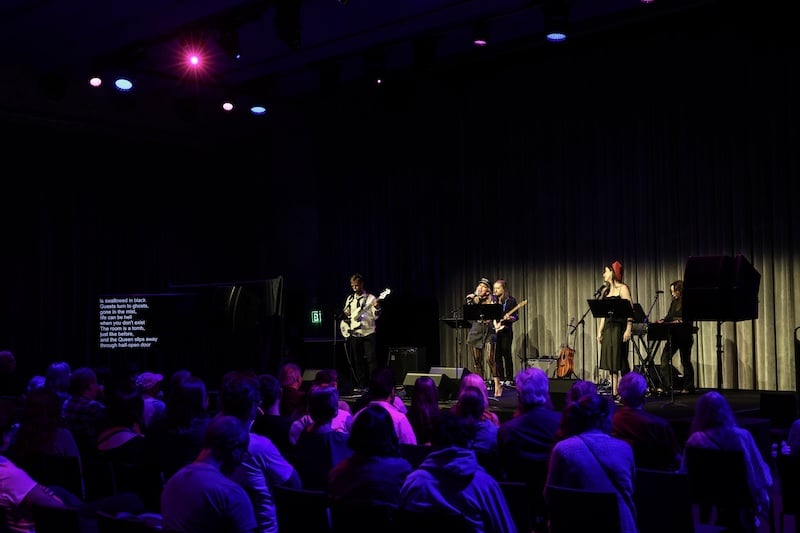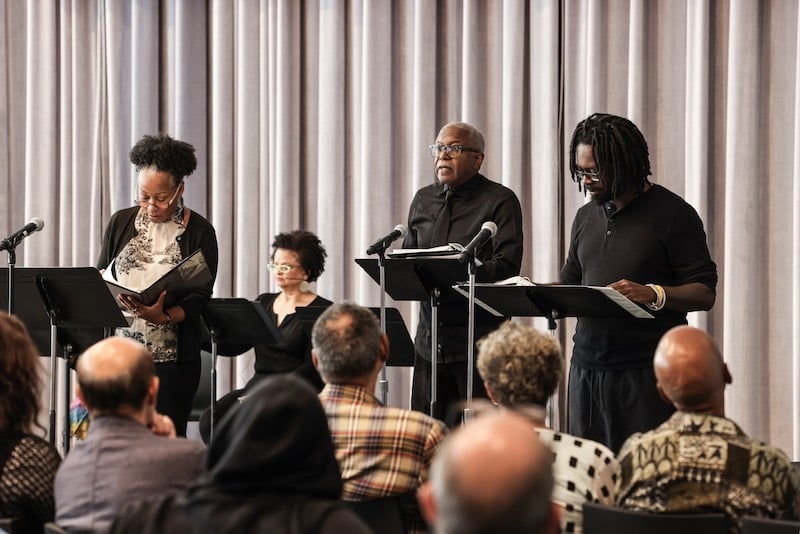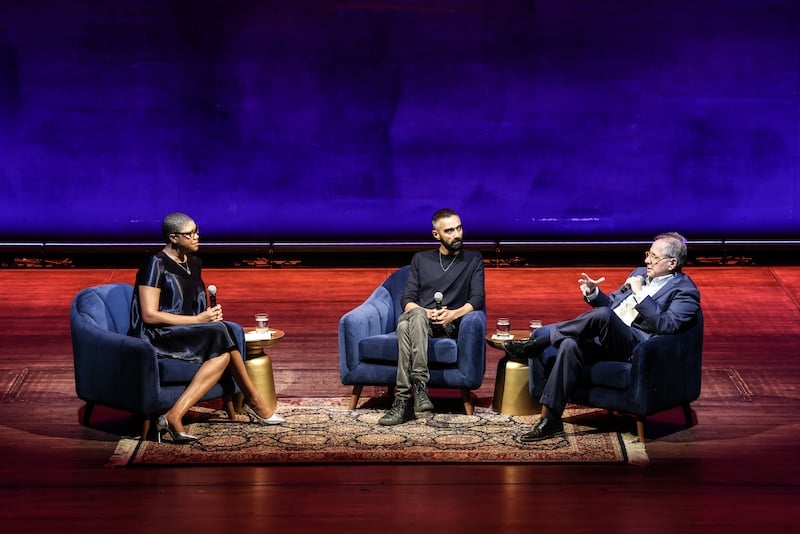By Ravelle Brickman and John Stoltenberg
Now in its second year, Kennedy Center’s free Local Theatre Festival showcased an invigorating day full of new work by DMV theater companies and playwrights on August 24, 2024. The smartly curated and generously resourced event, a Social Impact program, took over the REACH, Kennedy Center’s invitingly angular complex of rehearsal studios and performance spaces. (For background on the festival, see this news story.)

Whereas the Local Theatre Festival’s popular predecessor, Kennedy Center’s annual free Page-to-Stage weekend, was unticketed such that audiences could pop in on impulse (and if a performance was full, seek out another), this year’s reservation system and house-management protocol required foresight and a leap of faith. Online registrants were forewarned:
This is a first come-first served event; a reservation confirmation does not guarantee a ticket. Please arrive early to exchange your email confirmation at the REACH Box Office for entry to the festival event(s).
As it turned out, that implication of chancey entry was unneeded: thanks to accommodating box office staff, last-minute tickets were easy to come by, as attendance was well below capacity. Yet by rights the place should have been thronged as Page-to-Stage once was, and more so considering Social Impact’s high-caliber programming — all of it worthy and some of it a surfeit of surprise and satisfaction. For instance, here’s a report on a sampling of performances, staged readings, and a workshop on offer in the 2024 Local Theatre Festival. —J.S.
Cage Free Voices: Money Talks
Kira, Darrow, and Angel — three girls, ages 9 to 17 — danced their way onto the stage, where they performed a medley of songs illustrating the power and potential abuse of cash.
They were there as part of Cage Free Voices, a summer camp program sponsored by the Kennedy Center and attended by kids from across the U.S. Guided by “Mr. Chris,” the director of the program, the girls sang and recited poetry they had written.
Asked what they would do if they had lots of money, their answers ranged from “save it” to “buy school supplies.” Darrow, a budding actor from Tyrone, Georgia, summed it up. “I would get on the stage, pay for college, and buy my parents a new house,” she said. —R.B
Spooky Action Theater: Professor Woland’s Black Magic Rock Show
Directed by Elizabeth Dinkova. Composed by Michael Pemberton. Performers: Marika Countouris (music director), Ricky Drummond, Alec Green, Lauren Janoschka (assistant music director), Fran Tapia

Audiences lucky enough to land at Professor Woland’s Black Magic Rock Show were treated to excerpts from a rock opera so breathtaking that it’s bound to reap rhapsodies of praise when it opens at Spooky Action Theater in March of 2025.
Based on The Master and Margarita by Mikhail Bulgakov, it was performed on a bare stage by a talented troupe of anonymous actors — playing the devil, the poet, and his mistress — and a group of supposedly itinerant musicians. The show, set in Moscow in the 1930s, highlights the terror of living under authoritarian rule.
Michael Pemberton, who wrote the music, took the stage after the show and revealed that he had modeled it on Jesus Christ Superstar. The concept, he told Festival-goers, with a devil-take-all wink, is also similar to Hadestown. —R.B.
Tom Minter: By Me You’ll Never Know
Performers: Bernie Alston, Patricia Dugueye, Gregory Ford, Jeremy Hunter, Marjorie Johnson, Wilma Lynn, JoAnna Rhinehart, David Skeist
Stage Manager: Amberrain Andrews

A cast of superb actors — including DCTA’s own Gregory Ford — took the stage in Tom Minter’s By Me You’ll Never Know, a play about family secrets, long buried beneath the veneer of an upper-middle-class Black household.
Jeremy Hunter played the central character, Ken, the well-born African American son who returns to the U.S. after years abroad. Although determined to unravel childhood mysteries, he finds that his father, having succumbed to dementia, can reveal only fragments of a disconnected past.
In addition to the father, played with gentle fragility and an elfin caprice by Ford, there is a stepmother who bristles with propriety, a godmother who dispenses laughter, a step-aunt armed with irony, and Ken’s white boyfriend, whose family, unlike Ken’s, has welcomed him into their world.
“Memory is not the same as remembering…,” observes one of the characters in this intricate but funny drama. Minter, who holds a local theater residency at the Kennedy Center, told me that plans for a professional production are now being finalized. —R.B.
Ifa Bayeza: One Small Alice

Unlike other performance spaces at the Festival, the one reserved for One Small Alice was packed. In fact, the size of the audience, which was practically hanging from the rafters, was a fitting tribute to the playwright, Ifa Bayeza — who wrote The Till Trilogy — and the director, Psalmayene 24. Psalm, as he likes to be known, has brightened the Washington theater scene as a playwright, choreographer, and actor, along with his recent directing triumphs.
The play itself — now in development — is a classic runaway-slave story embellished by bits of Lewis Carroll’s Alice in Wonderland and Through the Looking Glass.
Haunting and hunting Alice at this performance were a bunch of villains, including the vicious Slave Trader and the nasty and spoiled Owner’s daughter. Her friends, on the other hand, were spiders, squirrels, a bear, and even the legendary Br’er Rabbit, who led the group down a hole.
Set in the 1850s, this excerpt ends in 1857, when the heroine, 9-year-old Alice, joins a circus. The performers, all from Generations Now, were at the Kennedy Center courtesy of a collaboration between Children’s Theatre Co. of Minneapolis and Penumbra Theatre, St. Paul. —R.B.
Melissa Flaim: Stage Dialects
(One of the highlights of the Local Theatre Festival was a workshop on dialect. Steve Silver, a friend of DCTA, give us this report.)

Nearly two dozen people attended a workshop on dialect conducted by Melissa Flaim, head of the BFA acting program at Catholic University and a leading actor and voice coach in the DC area. The workshop focused on the sound of Standard British English — known as Received Pronunciation, or RP for short — and illustrated the importance of articulation.
The basis of RP, Flaim explained, is to have a broad soft palate, so that the sound is directed from the back of the mouth toward the teeth. Participants practiced British expressions and learned to distinguish between the sounds of the upper classes, centered in London, and the regional dialects, such as those in the west and north.
Jeremy Hunter: Thank You for Sharing

“I have a little dick,” admits the Moderator at the top of Thank You for Sharing, Jeremy Keith Hunter’s raucously funny and brutally frank interrogation of Black male gender identity and self-esteem. “One of the basic tenets of being a Black man in America is to have a big dick,” acknowledges the Moderator (played by Hunter), in a disarming laugh-out-loud riff on the subject. But:
What if…
and go with me on this one here…
What if it didn’t matter?
What if I was MORE than my penis?
So begins this fearless new play, directed by KenYatta Rogers, written in the form of a Black men’s support group that the Moderator has dubbed the Little Dick Club. In attendance are a half dozen vividly delineated characters who each take the stage with a powerfully personal testimonial.
First up is a parodied image consultant, played by Prince Bajon Bihai IV, who in hip-hop verse coaches how to be a “high-value man”:
My job is to help you guys look good, smell great and be the best version of yourself each and every day….
First and foremost: a high value man starts with money…. The reason you feel like you have no value is directly linked to your pockets being empty. You feel no value, because you have no value, make sense?
Next, Shaquille Stewart plays a rapper named T-Mac (short for toxic masculinity, “the hottest artist in the city”), who blasts a brash, emotionally raw monologue about the pain of having his dad be killed when he was nine (“I have no example”) and now trying to be there for his daughter.
Next, Louis E. Davis as Revelation invites the audience to take out their phones and play a game on Zoom, picking between either/or choices (e.g., You are 15 and living in poverty: heads you go to school, tails you run the streets. You pick heads — but the education system is broken and you are expelled). With each such forced choice, the stakes escalate until the available options lead to prison — which occasions a line that could encapsulate the play:
As a man, you are a slave to your trauma.
Next, Tremon Mills appears as Beau wearing a MAGA hat, and during his mind-blowing monologue, he subverts our national whiteness/manhood mania:
As a man, I wear this hat because I believe in the man who coined its original meaning: Donald J. Trump.
…
I believe Donald Trump, more than any other president since the founding of this nation, represents who we as Americans are today… fat, old, weak, corrupt, greedy, unfettered, unchecked, unbound capitalism made flesh. Neanderthalic, European, Caucasian history repeating itself in the modern day.See, what you gotta understand is this: Donald J. Trump… is the devil. Make no mistake — old, wealthy, white men are all demonic and evil… but … Trump is the apex.
…
and I believe him to do the work of the devil — the fulfillment of prophecy depends upon it. I want Donald J. Trump to bring about that great white apocalypse.
Abruptly the play becomes an all-cast newscast report on an NBA star player who has been accused of commiting a sexual assault 20 years ago. The news crew follows the basketball legend, played by Prince Bajon Bihai IV, to the Little Dick Club, where he gives his side of the story: He presumed what happened was consensual because the young woman “never said stop.” But a group member played by Tremon Mills calls him on it:
Hold up! Before we even try to color this narrative: get it right. Silence is Violence. I have to say this: MEN. MEN! I’M TALKING TO THE MEN RIGHT NOW. IF SHE DOESN’T SAY YES —IF SHE DOESN’T VERBALLY SAY YES— IT’S NOT CONSENSUAL SEX. Flat out. Period. End of story. I know it takes two-to-tango. I know that women can give mixed signals. I KNOW that. We all KNOW that. But it’s got to be said. It HAS to be said until we get it. For the record, for the room, and for men and boys everywhere.
As a man. Control! Your! Dick!
The final scene is Shaquille Stewart’s wrenching monologue playing Will, a divorced father who has lost custody of his beloved daughter: “… a huge part of my life, my identity, and my purpose for being… as a man… has been ripped away from me!”
In transitions between these sharply drawn sharings, the Moderator leads poetic evocations of the ancestors, audience-participation deep-breathing exercises, and mindful meditations centering the body. The sum of these singular parts is a riveting synthesis of hilarious standup, healing transcendence, and brave public soul-baring. The writing is amazing and the truths in it profound. —J.S.
The State & Future of Theater Criticism

The evening before, April 23, Social Impact Senior Director Victoria Murray Baatin moderated a convivial conversation between Peter Marks and Naveen Kumar, the former and just-begun Washington Post chief theater critics. Their full discussion is below on YouTube (where DCTA Executive Editor John Stoltenberg’s interview with Peter Marks is cited at 06:04.)



